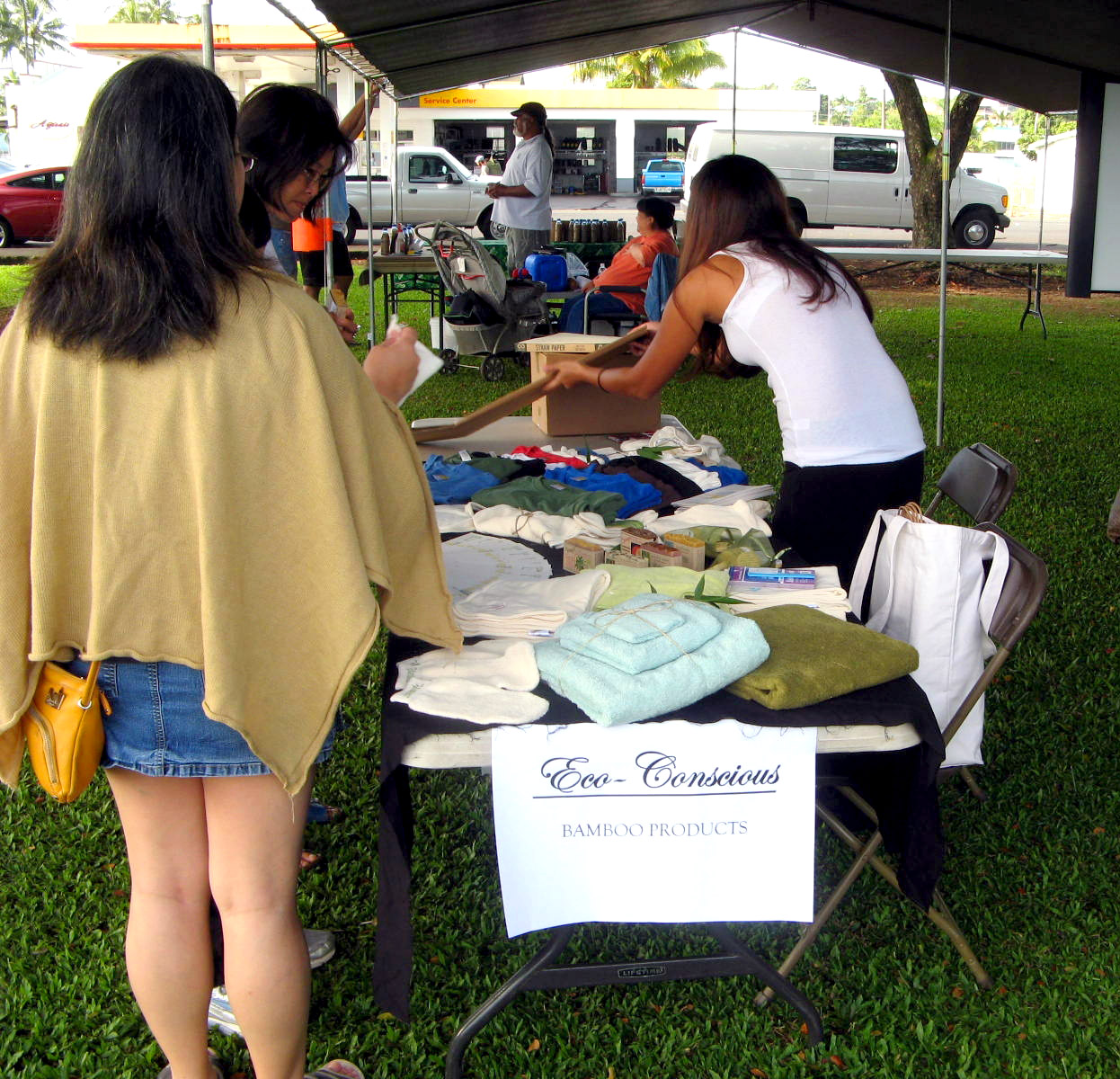When Daniel Krause was on a surf trip to Bali, he only had one towel with him, and though he didn’t wash it for almost three weeks (no laundromat handy) it stayed odorless. “I even used it as a pillow,” he says.
It wasn’t just any old towel – it was one his girlfriend had gotten him that was made of bamboo pulp. Bamboo products are sometimes compared to silk and cashmere, he says, or the softest of all cottons. Krause and his girlfriend Janie Vea, both of Hilo, were so impressed with the bamboo products they are now selling them under the brand name “Eco-Conscious.”
They set up a booth at the E Malama ‘Aina festival recently, and also appeared at a craft fair. Since then they have gotten lots of repeat customers.
“We thought the number one seller would be t-shirts,” says Daniel, “but a lot of people are buying the towels.”
From the Eco-Conscious website:
Antibacterial/ Antimicrobial. Bamboo possesses a property called “Kun,” a natural antifungal & antibacterial agent that prevents bacteria from cultivating, making the fabric odor-free. According to research done by the Japan Textile Inspection Association, tests on bamboo fiber have shown that these properties described above will remain unaffected even after 50 launderings.
Hypo-Allergenic. With the property of the bamboo kun & its naturally soft and smooth fiber properties that are non-irritating to the skin, it’s ideal for people with skin sensitivities or other allergies and dermatitis.
Thermal Regulating. Due to its wicking qualities, it draws away sweat & moisture away from the skin, keeping you cool in the summer and warm in the winter.
Quick Absorption. The micro–holes on bamboo cloth allows quick absorption & evaporates sweat rapidly. Bamboo fiber is four times more absorbent than cotton.
Breathable. The porous qualities of bamboo fiber account for its breatheabilit,y making it ideal for hot weather or exercise.
Provides UV protection. Bamboo naturally provides added protection against the sun’s harmful UV rays. It blocks 91 percent of UVA & 98 percent of UVB.
100% Biodegradable. Unlike synthetic fibers, which incorporate petroleum additives, bamboo clothing is safe for municipal disposal programs, whether by landfill or incineration.
Some other products claim to be antibacterial and antimicrobial, Daniel explains, but that’s because chemicals are added. “Bamboo holds its natural features,” he says. “It doesn’t take any pesticides or fertilizer to grow it. And it’s really sustainable, because it matures in three to four years, compared to other softwoods that take 20 years to grow.”
He and Janie are selling their products online, for now, at their website. Products include bamboo clothing and bamboo household products. “Bed, bath and clothing,” he characterizes the collection.
“Our main goal? Since the brand is called Eco-Conscious, we want people to listen to their ‘eco-conscience,’” he says. “Our goal is to kind of plant an eco-conscience seed in people, where you walk by a piece of trash on the ground and you think twice about it. Not only toward our products, but to really sustain the island.
“We’re so dependent here,” he says. “We import so many goods. We want this to be a better community and to be a leader for the other islands and the mainland. To show that it can work.
“We can do well in spite of being at such a disadvantage. I find a lot of people are trying to help out.”
Richard is one of the many who experienced the Eco-Conscious products at the recent E Malama ‘Aina sustainability festival. “The bamboo fiber products were so unbelievably soft,” he says. “It was striking. I can see why their sales are up.
“I was happy to see them at the festival.“

